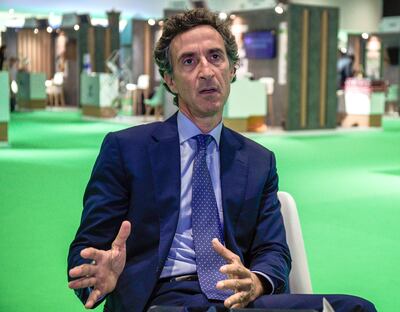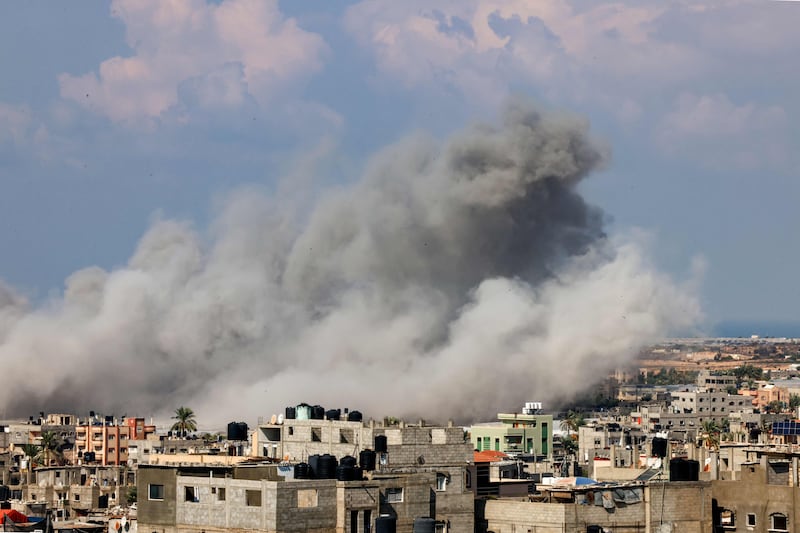Egypt’s Orascom Development expects the tourism sector and foreign direct investments in the Middle East region to be affected by the Israel-Hamas war and the continuing geopolitical tensions in the region.
The Switzerland-listed company, with assets worth more than $2 billion, is involved in the development of integrated townships with residences, hotels, retail and other amenities in seven countries including Egypt, Switzerland, Oman, Morocco, England, Montenegro and the UAE.
“I think foreign direct investment in the region is going to probably take a hit (in the short term) because most people, most foreign investors, particularly Western investors, don't necessarily fully understand that the interlinkages between different parts of the region, where the real direct effect is, where the indirect effect is?,” Omar El Hamamsy, group chief executive of Orascom, told The National on the sidelines of the World Investment Forum 2023 in Abu Dhabi on Monday.
The tourism sector is also expected to suffer amid heightened tensions in the region.
“[Tourism] revenue will decrease because people will feel that there is a security concern,” he said.
“That will be another unfortunate hit on our business and more generally, on tourism in the region, which will hit the current accounts of many North African countries as well as some of the GCC countries.”
Capital accounts will also be negatively impacted in the short term as investors will be hesitant to invest in the region amid the continuing conflict.

In the long term, however, the war will “trigger serious conversations and a serious engagement and a serious solution that will ultimately bring peace to the entire region”, Mr El Hamamsy added.
“It may take a few months, a few years … and it helps everybody, helps both the human aspect of it, but also the business.”
Thousands of people have died in the war that began after Hamas broke through the border fence and stormed Israel's south last week. Israel responded by launching a barrage of air strikes on the Gaza Strip and has asked 1.1 million people in the northern half of the enclave to evacuate.
Last week, US Treasury Secretary Janet Yellen said Washington is monitoring the economic impact of the conflict but does not expect it to be a major driver of the global economic outlook.
JP Morgan chief executive Jamie Dimon has said the Israel-Gaza war could have serious geopolitical consequences for the global economy.
“The war in Ukraine, compounded by last week’s attacks on Israel, may have far-reaching impacts on energy and food markets, global trade, and geopolitical relationships,” Mr Dimon said in the third-quarter earnings statement on Friday.

Orascom is looking to expand its operations in the countries where it currently operates and enter new geographies, including Saudi Arabia, Mediterranean countries and Africa, despite the current challenges.
“The first expansion plan is of course on developing the existing land that we have … places like Salalah in Oman … like the Adriatic Sea in Montenegro … places on the Red Sea of Egypt,” Mr El Hamamsy said.
“The plan is to continue building both real estate and hospitality and other retail and marinas and ski slopes, among others.”
The company owns a land bank of more than 100 million square metres, with nearly 40 per cent developed or under development in different countries. Its hospitality portfolio includes 33 luxury hotels with more than 7,000 rooms across Europe, the Middle East and North Africa.
“We still have another 60 or so million square metres to develop on the existing land bank that we have and we are probably now running at a pace of roughly 2 million square metres every year,” Mr El Hamamsy said.
On the funding strategy, he said, the company has the “ability to self-fund … both directly from our own cash flows, but also with investors that we bring in together with us in those places, be they private investors, or in some instance public investors who want to have an ownership stake in certain types of assets like our hotels, or our other recurring revenue generating assets like our marinas or our schools or hospitals or airports”.
Orascom reported 265.9 million Swiss francs ($294.85 million) in revenue and a net profit of 17.7 million francs in the first half of the year, and the second half is looking “very good in terms of sales, revenue and profits”, he said.
Egypt, Switzerland, Oman and Montenegro are the biggest contributors to its revenue with 42 per cent coming from hospitality, marinas, schools and retail, while about 40 per cent to 45 per cent comes from property sales.
“I expect that Egypt will continue to grow very healthily,” Mr El Hamamsy said.
“Oman is on a very nice acceleration. We are doubling down on our focus there, our investments there. We are very excited about the potential of the country.”
In Montenegro and Switzerland, the company is recording 30 per cent and 10 per cent year-on-year growth, respectively.
“We are very optimistic across those four destinations, and we continue very aggressively investing,” Mr El Hamamsy said.
The company is also focusing on protecting the environment and “we want to develop responsibly and sustainably for the next hundreds and hundreds of years”, he said.







